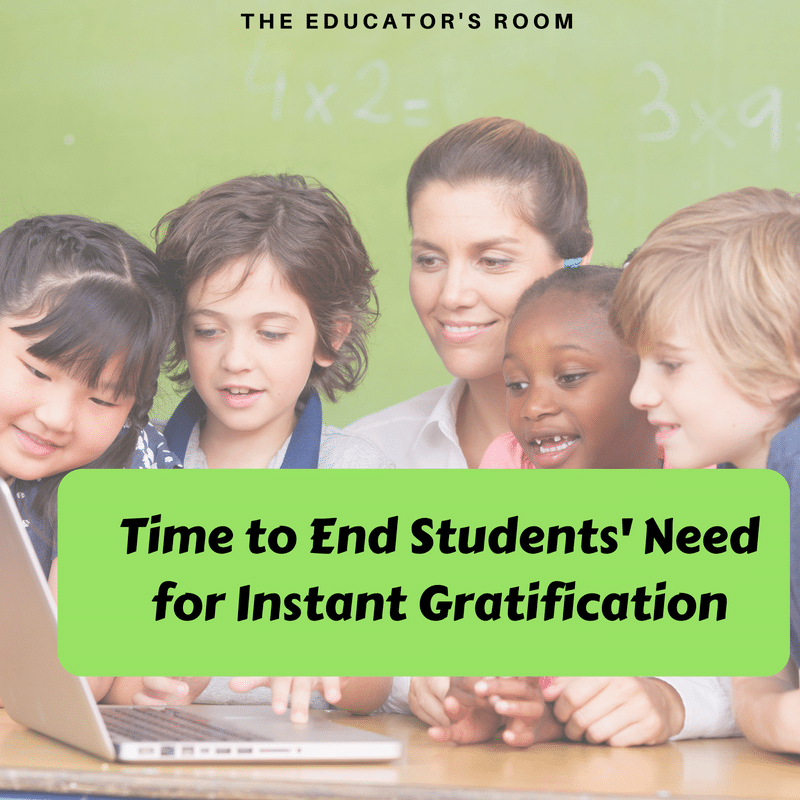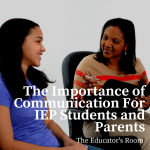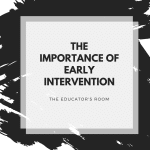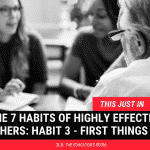When you were in your educational psychology class a few years back, you probably learned about instant gratification. This behavior, at heart, is when we pursue what we want, when we want it. Often, that means now. The primal need couldn’t be more evident in our school children – and it’s up to us educators to redirect it.
That’s more true now in the digital age than ever. When students want to contact someone, they pick up the phone and text them. When they want information, they pick up the device and research it. When they want music, they turn to iTunes or Spotify and access your digital library. When someone wants to schedule something, well, their calendar is very accessible at their fingertips.
So is just about everything – except patience.
For the past few days in my class, students have been working with me in our IMC / library. Each student is working on their own project – either intensively researching for their National History Day project in my advanced classes or composing an essay as to why travelers wanted to immigrate to specific colonies. During that time, I’m asking these 12- and 13-year-old 7th graders to think and work for themselves and by themselves. My role is to provide “guide on the side” oversight. Indeed, during our 43 minute periods, students will often have questions and need redirection. That’s what I’m there for, and a well-composed and scaffolded lesson coupled with a teacher can typically empower any student to succeed on a self-directed project.
But one thing I’ve noticed is that some students have no idea where the boundary is to ask those questions and seek my advice. In fact, some students don’t even see you talking to somebody else, whether it’s one of their peers or one of my own. They just know that they have a need / question / concern. And they need the answer now.
To them, I am nothing more than an app, a website, a click of a button – and we educators need to stop the instant gratification needs in its tracks.
[fusion_builder_container hundred_percent=”yes” overflow=”visible”][fusion_builder_row][fusion_builder_column type=”1_1″ background_position=”left top” background_color=”” border_size=”” border_color=”” border_style=”solid” spacing=”yes” background_image=”” background_repeat=”no-repeat” padding=”” margin_top=”0px” margin_bottom=”0px” class=”” id=”” animation_type=”” animation_speed=”0.3″ animation_direction=”left” hide_on_mobile=”no” center_content=”no” min_height=”none”][bctt tweet=”we educators need to stop the instant gratification needs in its tracks.” username=”EducatorsRoom”]
It’s up to us to reclaim the humanity in our conversations. Here’s how:
- When you are speaking with a student / staff member, give them your 100% undivided attention. That means no fiddling with your email. That means no checking your phone. Or your watch. Or your next lesson plan. Sure, when students are working, you can, too. But when they have a question, model the appropriate communicative behavior.
- When an instant gratification student (IGS) tries to speak with you while you are having a conversation, have a stern and quick response. Mine is “sit down.” I don’t even make eye contact with them. I just point and have them go sit down. I find it to be rude and, truly, I care about the person I’m conversing with. The IGS needs to as well.
- Speak with the IGS – in private and on your terms – and explain to them why their behavior is an issue. Frederich Wilhelm von Steuben, the famous Prussian General who helped train Gen. Washington’s army at Valley Forge one time (apocryphally) quipped, “You say to your [European] soldier, ‘Do this’ and he does it. But I am obliged to say to the American, ‘This is why you ought to do this’ and then he does it.” The same can be said about our students. If you want to change an American’s behavior, explain why.
- Ask the IGS to watch other students raise their hand or approach you in a positive and patient way. There has to be someone in your class who is a model, patient student. Implore those who can’t wait to observe them.
- Praise the IGS when they do ask for your attention in that same positive and patient way. It doesn’t need to be much, a simple “Thank you for patiently waiting for me. I’m sorry it took so long, but I appreciate it.”
- Repeat until the behavior subsides or changes. And over. And over. And over.
Habits are undeniably hard to break. But not impossible. To paraphrase Audrey Hepburn, “the word impossible even says ‘I’m possible.'”
This habit is one of the most unrecognized and yet most important to establish in our students. While instant gratification is part of the culture in which we now live, it should not be the norm. Human interaction is. In fact, it’s our oldest and most efficient form of communication. Proper communication, undoubtedly, is our most primal need – more than instant gratification. We just have to properly frame it for our students.

[/fusion_builder_column][/fusion_builder_row][/fusion_builder_container]






